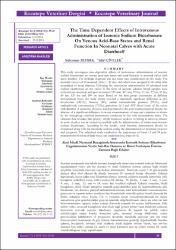The Time Dependent Effects of Intravenous Administration of Isotonic Sodium Bicarbonate on Venous Acid-Base Status and Renal Function in Neonatal Calves with Acute Diarrhea
Özet
This study investigates time-dependent effects of intravenous administration of isotonic sodium bicarbonate on venous acid-base status and renal function in neonatal calves with acute diarrhea. The etiologic diagnosis was not taken into consideration in this study. The material consists of 10 neonatal calves (1-30 days old) which were accepted to the clinic with complaints of acute diarrhea. Following the intravenous administration of calculated total sodium bicarbonate on the calves in the form of isotonic solution blood samples were collected pre-treatment and post-treatment: 15th min, 30th min, 1st hrs, 2nd hrs, 3rd hrs, 4th hrs, 6th hrs, 12th hrs and 24th hrs later. Based on the intra-group assessments at different measurement times, the study results revealed a statistically significant difference in pH, bicarbonate (HCO3-), basicity (BE), partial carbondioxide pressure (PCO2), total carbondioxide concentration (TCO2), potassium (K+) and AST blood levels of the calves with diarrhea. A numerical decrease was determined in the post-treatment period despite the absence of a significant difference in serum concentrations of urea and creatinine as shown by the intra-group statistical assessments conducted in line with measurement times. The obtained data revealed that primary simple metabolic acidosis occurring in calves in relation to acute diarrhea can be treated successfully with the administration of intravenous isotonic sodium bicarbonate. According to the results, renal function deterioration should be considered along with the metabolic acidosis during the determination of treatment protocol and prognosis. The submitted study emphasizes the importance of hours 12 and 24 posttreatment for blood acid-basis status and renal function, respectively. Sunulan araştırmada akut ishalli neonatal buzağılarda intravenöz izotonik sodyum bikarbonat uygulamasının venöz asit-baz durumu ve renal fonksiyon üzerine zamana bağlı etkileri araştırıldı. Çalışmada etiyolojik tanı dikkate alınmamıştır. Materyali; yaşları 1-30 gün arasında değişen akut ishal şikayeti ile kliniğe başvuran 10 neonatal buzağı oluşturdu. Çalışma kapsamında, hesap edilen total bikarbonat ihtiyacı izotonik solüsyon tarzında intravenöz yolla buzağılara verildikten sonra, tedavi sonrası; 15. dakika, 30. dakika, 1. saat, 2. saat, 3. saat, 4. saat, 6. saat, 12. saat ve 24. saatte kan örnekleri toplandı. Çalışma sonuçları, ishalli buzağılarda, farklı ölçüm zamanları arasında gerçekleştirilen grup içi değerlendirmede; pH, bikarbonat, baz durumu, parsiyel karbondioksit basıncı, total karbondioksit konsantrasyonu, potasyum ve aspartat amino transferaz kan düzeylerinde istatistiki açıdan önemli derecede bir farkın olduğunu ortaya koydu. Üre ve kreatinin serum konsantrasyonlarında ise ölçüm zamanlarına göre gerçekleştirilen grup içi istatistiki değerlendirmede önem arz eden bir fark belirlenmemesine rağmen, tedavi sonrası dönemde numerik bir azalma belirlenmiştir. Elde edilen veriler, neonatal buzağılarda akut ishale bağlı gelişen primer basit metabolik asidozun intravenöz izotonik sodyum bikarbonat uygulaması ile başarılı bir şekilde tedavi
edilebileceğini ortaya koydu. Sonuçlara göre, neonatal buzağı ishallerinde tedavi
protokolünün belirlenmesi ve prognozun tayininde, metabolik asidozun yanı sıra renal fonksiyondaki bozulmanın da göz önünde bulundurulması gerektiği değerlendirildi. Sunulan çalışma, buzağılarda neonatal akut ishallerde kritik değişim noktası olarak, kan asit-baz durumu için; tedavi sonrası 12. saatin ve renal fonksiyon için ise tedavi sonrası 24. saatin önemli olduğuna vurgu yapmaktadır.
Cilt
7Sayı
1Bağlantı
http://hdl.handle.net/11630/2357Koleksiyonlar
- Cilt 7 : Sayı 1 [13]



















